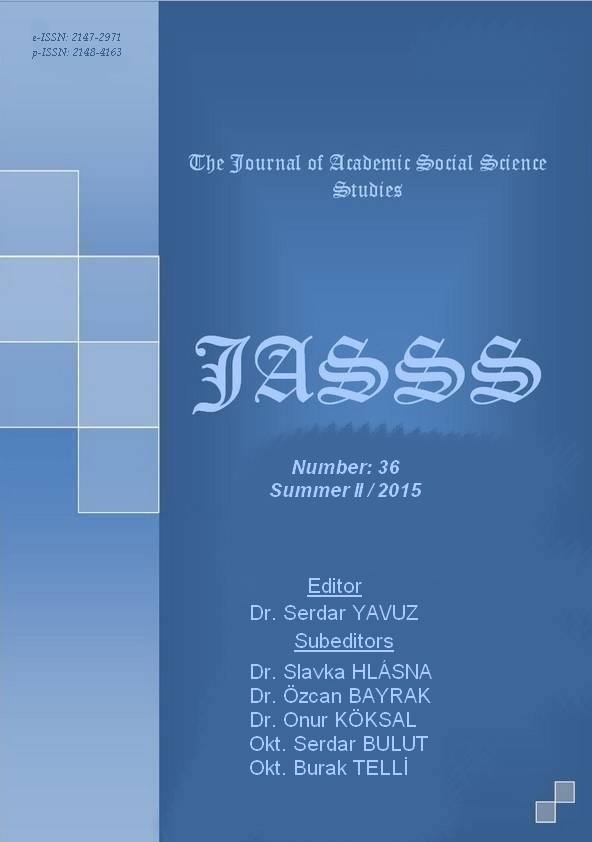DÖRDÜNCÜ SINIF SOSYAL BİLGİLER DERSİNDE DOĞRUDAN VERİLECEK DEĞERLERİN KAZANILMA DURUMUNUN DEĞERLENDİRİLMESİ
Author :
Abstract
21. yüzyıl değerlerin ve değer eğitiminin öğretim programında gerekli ve önemli olduğu bir yüzyıl olarak başlamıştır. Değişen ve karmaşıklaşan dünyada ulusal düzeyde kimlikleri oluşturan ve evrensel boyutta önem arz eden değerler programlarda doğrudan verilmesi uygun görülen değerler halini almıştır. Bu araştırmanın genel amacı dördüncü sınıf sosyal bilgiler dersinde doğrudan verilecek değerlerin kazanılma durumunun değerlendirilmesidir. Araştırma genel tarama modelinde bir çalışma olarak düzenlenmiştir. Araştırmanın evrenini Çanakkale ilinde bulunan ilkokulların dördüncü sınıf öğrencileri oluşturmaktadır. Araştırmada veri toplama aracı olarak araştırmacı tarafından geliştirilen doğrudan verilecek 8 değeri ölçen “Doğrudan Verilecek Değerler Ölçeği” kullanılmıştır. Veriler bir ders saati içerisinde, okulun diğer derslerini etkilemeyecek biçimde, sınıf öğretmenleri gözetiminde araştırmacı tarafından toplanmıştır. Araştırma, toplam 397 öğrenci üzerinde yürütülmüştür. Verilerin analizi için Statistical Package for the Social Sciences-22 paket programı kullanılmıştır. Verilerin analizinde frekans, yüzde ve bağımsız gruplar için t-Testi tekniklerinden yararlanılmıştır. Araştırmadan elde edilen sonuçlara göre ilkokul dördüncü sınıf sosyal bilgiler dersinde doğrudan verilmesi hedeflenen değerlerin tümünün öğrenciler tarafından yeterli düzeyde kazanıldığı ortaya çıkmıştır. Bununla birlikte öğrenci cinsiyeti, ailenin ekonomik durumu ve sınıf mevcudu değişkenlerine göre öğrenci puanlarında anlamlı bir farklılık olmadığı anlaşılmıştır. Sosyal bilgiler ders başarısı değişkenine göre ise 8 doğrudan verilecek değerin çoğunda ders başarısı yüksek olan öğrenciler lehine anlamlı bir farklılığın olduğu sonucuna ulaşılmıştır.
Keywords
Abstract
21st century has been a century in which values and value education are significant and necessary. The values which are universally importance and shape the identities at national level in this changing and complicating world, have been considered appropriate to be directly offered in the value curricula. The general purpose of this study is to evaluate the development of the values directly offered in the fourth-grade of social studies. The survey was carried out by means of general screening model. The population of the study consists of fourth-grade students at the primary schools in the city of Çanakkale. The "Scale of Directly Offered Values" developed by the researcher to measure 8 directly offered values were utilized in the survey as the data collection tool. The data were collected by the researcher under the guidance of class teachers within a course hour so as not to impact the other courses at the school. The survey was carried out with a total of 397 students. Statistical Package for the Social Sciences (SPSS-22) program was used in the data analysis. The study utilized the techniques of frequency, percentage, and independent samples t-Test methods. According to the results acquired from the study, it was concluded that all values to be offered directly in the fourth-grade of social studies were adequately acquired by the students. However, it was realized that there has not been a significant difference between the scores of the students in terms of gender of the student, the parental economic status and class size. The study also concluded that in terms of achievement in social studies course, there has been a significant difference in favour of the students with high achievement in the social studies course in most of the areas of 8 directly offered values.





